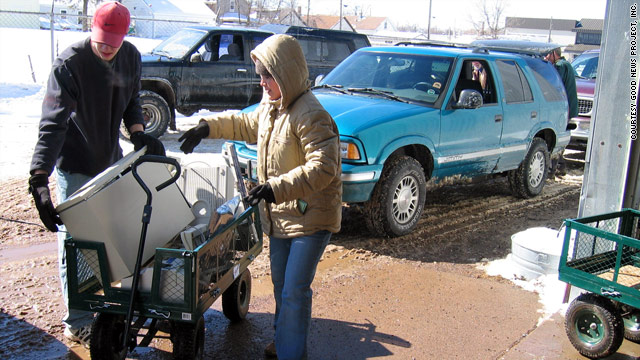Good News for the environment is good news for people in need

- Good News Project has eight recycling events per year in Wausau, Wisconsin
- The money raised helps pay for mission trips and helping out in the local community
- New recycling law causes some uncertainty around potential costs, profits for events
- Items that still can be used are donated to groups in the West Indies
One Simple Thing features people who, through small yet innovative ways, are making a difference in education, energy, the environment and the use of the planet's resources.
(CNN) -- A few years ago, the folks at the Good News Project were looking for another fundraiser that would bring them some needed cash.
A volunteer proposed an event that would also bring them some good karma: electronics recycling.
These days, it can still be hard to find a recycling event for your old computer or TV. Most are sponsored by cities and counties and held once a year.
But Wausau, Wisconsin, residents know to check with the Good News Project, a 27-year-old charity that serves not only the area, it makes mission trips to the West Indies. Good News holds eight recycling events a year, even in the winter, collecting tons of old electronics. They charge by the pound (30 cents) with the funds collected going to the West Indies missions and also to charities in northern Wisconsin.
"People do want to do the right thing with their computers, and they know they are not supposed to toss them in the garbage," said Dr. Chuck MacCarthy, who co-founded the Good News Project with his wife, Peggy. "So many people pay us, and then thank us."
The recycling events bring in about $50,000 a year, before you factor in paying part of the salaries for two full-time employees and the ever-changing fees the end recyclers charge.
"That's where the negotiations have gone a little crazy in the past year," Chuck MacCarthy said, noting that Wisconsin passed a law in September 2009 that requires manufacturers to recycle 80 percent of their products, by weight. After Wednesday, many electronics must be recycled and cannot be thrown into landfills.
The MacCarthys and Executive Director Christine Daniels said everything is in a state of flux, with recyclers and manufacturers figuring out how the law should be applied and how it will affect costs.
"It's anybody's guess. We just keep plugging along," Peggy MacCarthy said.
"Every time we have a collection event, the arrangement we get from a recycling company is going to be a little different," her husband said.
Chuck MacCarthy said that in some months of this year, recyclers have charged just a flat rate per pound, but in the next month, they might charge for just the monitors. And then there's the transportation charge, which is sometimes waived, sometimes not.
Even though the electronics recycling process is a little muddled, Daniels said that Good News is going to expand its efforts to more cities, including Kaukauna, which is 100 miles from Wausau.
"We're lucky to have a Good News person there who has a facility where we can collect and a forklift," Daniels said. "And we have a bunch of volunteers who can help promote it and run the event."
It takes about 15 to 30 volunteers for each event (it helps if several are young and strong, Charles MacCarthy said), but without the free labor, electronics recycling would be a money loser. It also helps that as a nonprofit, the Good News Project was able to purchase the equipment it needed through government grants.
Good News makes sure that the end recycler is certified so that the e-waste is treated correctly.
"They will recycle 97 percent of the stuff that comes into their factory," Tom Fladland, operations manager for Good News, told CNN iReporter Mike Stouffer. "It's turned into new monitors, new plastics, toys. ... I've been there. I've visited the factory, I've seen their operation, and we wouldn't deal with them if they were [dumping the monitors in landfills]."
Take a recycling event day tour of the Good News Project warehouse
--Tom Fladland, Good News Project operations manager
Good News' desire to help the environment doesn't end with recycling. The project also makes rain barrels out of plastics donated by a local soda company, which were sold this spring at several garden sales.
And there's the little garden just outside the warehouse.
"Well, it's not so little any more," Daniels said. "We had some land out back that we had thrown some compost on. So for two years, we've been growing vegetables and giving them to our local food pantries."
The project has harvested more than 100 pounds so far, with potatoes and corn yet to be harvested.
In addition, the charity collects hospital supplies, which it lends to locals, and ships them to the islands of Dominica, Grenada, St. Lucia and St. Vincent, where Good News does its missionary work.
In the islands, volunteers build small homes (282 so far) and work in schools and an orphanage (in part built by the money raised at the recycling events). Doctors and nurses provide free health care at hospitals.
And the Air Force flies down pallets of electronics and humanitarian supplies that still have some life. Fladland estimated they ship about $250,000 worth of goods each year to each island.
The next recycling event is September 17-18, and while it is uncertain how much cash it will net Good News, the charity is determined to do what it can to help.
"We're not a passive nonprofit at all," Fladland said. "We're trying to make our own way. We're not standing still, and we're moving forward even in these tough times. And every year, we're just keeping our head above water."

 CNN iReport
CNN iReport